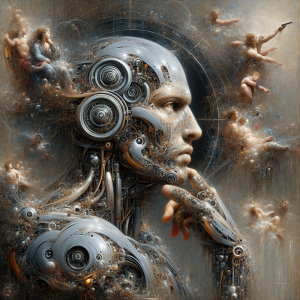Innovations in the Workplace: The Rise of Artificial Intelligence
In a joint exploration of technological evolution in professional environments, Microsoft and LinkedIn have unveiled critical discoveries within their latest research—the 2024 Work Trend Index. This index shines a light on the proliferating presence of artificial intelligence (AI) in the modern workplace, showcasing a transformative change in how work is approached and performed.
The groundbreaking advent of generative AI is leading workers to embrace these tools at a rate no one could have foreseen. Microsoft’s CVP of AI at Work, Jared Spataro, was quoted saying, “The adoption of AI in professional settings is growing far faster than anticipated.” An extensive survey conducted with 31,000 participants from 31 different countries, analysis of employment and recruitment trends on LinkedIn, and an evaluation of Microsoft 365’s productivity data and insights from Fortune 500 clientele form the foundation of these findings.
Workforce Utilization versus Executive Dilemmas
A striking disparity emerges from the data: while a significant portion of the workforce applies AI to boost efficiency, foster creativity, and elevate job satisfaction, business leaders grapple with the challenge of measuring AI’s investment rewards. According to the index, 75% of knowledge workers now integrate AI in their daily tasks. Meanwhile, 79% of executives recognize AI as a keystone for staying competitive, yet 59% express concerns over appraising its benefits for productivity. Moreover, there’s apprehension among 60% of leaders regarding the lack of a concrete strategy for AI deployment.
Satya Nadella, Chairman and CEO of Microsoft, points out, “AI is making expertise more accessible to employees everywhere.” Nadella underscores the potential of AI to empower organizations with refined decision-making capabilities and collaborative prowess, which in turn leads to enhanced business performance.
AI Economy and Evolving Career Landscapes
The labor market is adjusting to the dominance of AI, with notable spikes in professionals contemplating career transitions, as well as talent shortages in specialized sectors like cybersecurity and engineering. A remarkable “46 percent of workers globally considering a job change in the upcoming year” marks a trend not seen since the widespread career reevaluations during 2021’s Great Reshuffle. On LinkedIn, AI-related job listings have surged, reflecting the changing dynamics between employers and job seekers with AI competencies.
Ryan Roslansky, CEO of LinkedIn, remarks that leaders who prioritize agility over stability and invest in in-house skill development will secure an edge for their organizations.
Advancements in Microsoft’s Copilot for Enhanced AI Interaction
Acknowledging the challenges of generating precise prompts for AI, Microsoft has publicized new features for Copilot within Microsoft 365. Innovations such as prompt auto-complete and a chat feature named ‘Catch Up’ are anticipated to make engagements with AI more natural, shifting from structured commands to seamless dialogs. These feature upgrades are slated for future releases, with the intent to revolutionize the way users interact with AI.
Microsoft and LinkedIn are inviting everyone, from the workforce to leadership, to delve into the complete Work Trend Index Report as well as the wealth of information available on their platforms to better chart the influence of AI on the professional landscape.
























